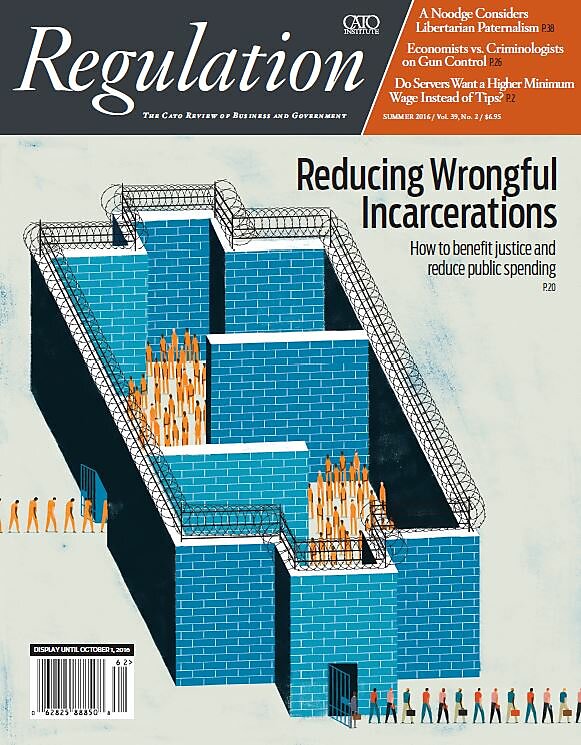The latest issue of Regulation magazine has been released on the Cato website.
The cover article, by Christopher Robertson and Jamie Cox Robertson of the University of Arizona, examines the extent of over incarceration in the U.S. Why are so many innocent people convicted of crimes? They review recent scholarship that concludes that many types of evidence introduced by prosecutors to convince jurors of guilt, such as bite mark, fingerprint, and bullet analysis, are not scientifically reliable. The authors suggest various remedies to the wasteful incarceration problem including public rewards for attorneys who demonstrate that a prisoner should be released.
Researchers John Lott and Gary Mauser explore empirical research on firearms. They found that the findings of such research vary systematically with the disciplinary orientation of the authors. A large majority of articles written by economists find that expanded legal access to firearms reduces crime and does not increase the suicide rate, and that gun owners who are approved for concealed-carry are less likely to commit crimes than ordinary Americans. In contrast Criminologists were more evenly divided on these questions.
Two articles critique regulatory rationales rooted in behavioral economics. In Infantilization by Regulation law professors Jonathan Klick and Greg Mitchell argue that protecting people from the effects of their choices reduces their ability to think critically about them. Georgetown ethics professor John Hasnas explores how much liberty is preserved under modern “libertarian paternalism.” He then asks whether the insights of behavioral economics apply to public decisions, argues yes, and concludes that U.S. Constitution is an excellent example of choice architecture.
One of the most discussed topics in higher education policy is the rate of inflation in university tuition. Top William and Mary economists find empirical evidence that highly selective schools reduce financial aid to students who receive federal tuition support.
In our Briefly Noted articles economist Ike Brannon argues that cities harm transit riders by over-providing subsidized parking near street corners. Brannon and the American Action Forum’s Sam Batkins question whether expanded family leave policies would harm workers. University of California, Irvine emeritus professor Richard McKenzie shares the results of his survey that found servers at fast-casual restaurants would not support substituting higher hourly wages for the current tipped-wage system. Finally, University of Michigan professor Thomas Hemphill lays out a practical approach to reforming occupational licensing laws.
Book reviews include Free Market Environmentalism reviewed by Timothy Brennan, Robert Reich’s Saving Capitalism and Robert Gordon’s The Rise and Fall of American Growth reviewed by David R. Henderson, and Phil Murray’s review of Dani Rodrik’s Economics Rules.
My Working Papers column describes papers on cigarette taxes and food stamps, e‑cigarettes and adolescent smoking, corporate inversions, and public housing and crime.

